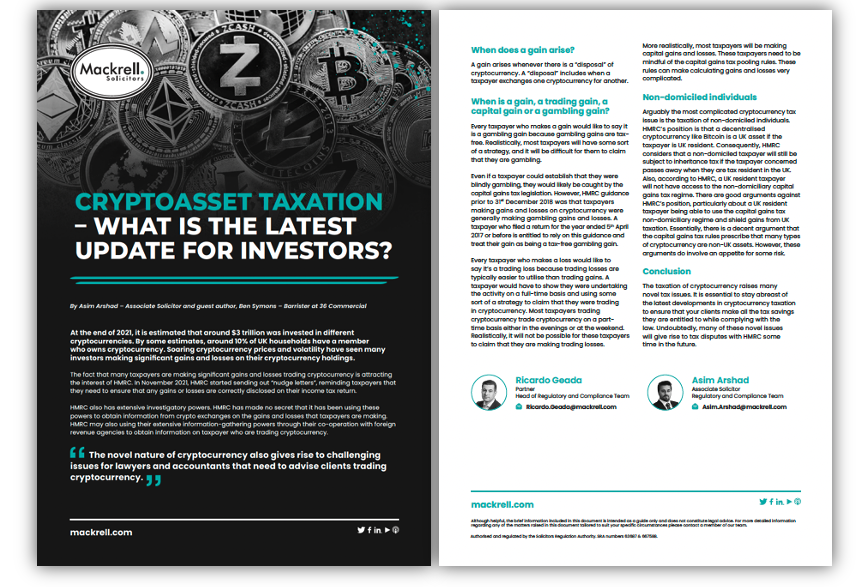Cryptoasset taxation in the UK - What's the latest update for investors? Asim Arshad from Mackrell Solicitors explains
At the end of 2021, it is estimated that around $3 trillion was invested in different cryptocurrencies. By some estimates, around 10% of UK households have a member who owns cryptocurrency. Soaring cryptocurrency prices and volatility have seen many investors making significant gains and losses on their cryptocurrency holdings.
In a recent article, Asim Arshad, Associate Solicitor at Mackrell Solicitors, part of our sister law network, Mackrell International, takes a look at some of the latest developments in crypto-taxation and how these may affect investors.
Asim writes:
The fact that many taxpayers are making significant gains and losses trading cryptocurrency is attracting the interest of HMRC. In November 2021, HMRC started sending out “nudge letters”, reminding taxpayers that they need to ensure that any gains or losses are correctly disclosed on their income tax return.
HMRC also has extensive investigatory powers. HMRC has made no secret that it has been using these powers to obtain information from crypto exchanges on the gains and losses that taxpayers are making. HMRC may also using their extensive information-gathering powers through their co-operation with foreign revenue agencies to obtain information on taxpayer who are trading cryptocurrency.
When does a gain arise?
A gain arises whenever there is a “disposal” of cryptocurrency. A “disposal” includes when a taxpayer exchanges one cryptocurrency for another.

When is a gain, a trading gain, a capital gain or a gambling gain?
Every taxpayer who makes a gain would like to say it is a gambling gain because gambling gains are tax-free. Realistically, most taxpayers will have some sort of a strategy, and it will be difficult for them to claim that they are gambling.

Even if a taxpayer could establish that they were blindly gambling, they would likely be caught by the capital gains tax legislation. However, HMRC guidance prior to 31st December 2018 was that taxpayers making gains and losses on cryptocurrency were generally making gambling gains and losses. A taxpayer who filed a return for the year ended 5th April 2017 or before is entitled to rely on this guidance and treat their gain as being a tax-free gambling gain.
Every taxpayer who makes a loss would like to say it’s a trading loss because trading losses are typically easier to utilise than trading gains. A taxpayer would have to show they were undertaking the activity on a full-time basis and using some sort of a strategy to claim that they were trading in cryptocurrency. Most taxpayers trading cryptocurrency trade cryptocurrency on a part-time basis either in the evenings or at the weekend. Realistically, it will not be possible for these taxpayers to claim that they are making trading losses.
More realistically, most taxpayers will be making capital gains and losses. These taxpayers need to be mindful of the capital gains tax pooling rules. These rules can make calculating gains and losses very complicated.
Non-domiciled individuals
Arguably the most complicated cryptocurrency tax issue is the taxation of non-domiciled individuals.
HMRC’s position is that a decentralised cryptocurrency like Bitcoin is a UK asset if the taxpayer is UK resident. Consequently, HMRC considers that a non-domiciled taxpayer will still be subject to inheritance tax if the taxpayer concerned passes away when they are tax resident in the UK. Also, according to HMRC, a UK resident taxpayer will not have access to the non-domiciliary capital gains tax regime. There are good arguments against HMRC’s position, particularly about a UK resident taxpayer being able to use the capital gains tax non-domiciliary regime and shield gains from UK taxation. Essentially, there is a decent argument that the capital gains tax rules prescribe that many types of cryptocurrency are non-UK assets. However, these arguments do involve an appetite for some risk.
Conclusion
The taxation of cryptocurrency raises many novel tax issues. It is essential to stay abreast of the latest developments in cryptocurrency taxation to ensure that your clients make all the tax savings they are entitled to while complying with the law. Undoubtedly, many of these novel issues will give rise to tax disputes with HMRC some time in the future.
For further information about all things crypto, contact Asim at [email protected] or visit the Mackrell Solicitors website.
Also, CLICK to find out more about the sectors in which Mackrell Solicitors is most active.
MGI Worldwide with CPAAI, is a top 20 ranked global accounting network and association with almost 9,000 professionals, accountants and tax experts in some 400 locations in over 100 countries around the world.

